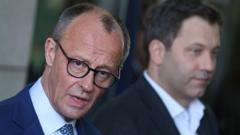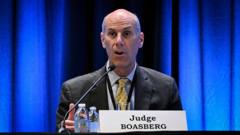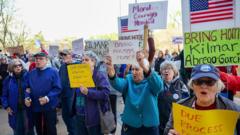After a prolonged period of political instability, Germany's conservative party led by Friedrich Merz has successfully brokered a coalition agreement with the Social Democrats, effectively resolving a five-month deadlock following the previous government's collapse.
Germany's Conservatives Forge Alliance with Social Democrats to End Political Deadlock

Germany's Conservatives Forge Alliance with Social Democrats to End Political Deadlock
A coalition deal signals a new government for Germany after months of uncertainty, as Merz aims for significant reforms.
Merz, 69, expressed optimism that this agreement sends "a strong and clear signal" to both Germans and the EU about Germany's renewed capacity for effective governance. Facing immense pressure to stabilize the political landscape, the coalition emerges as the Christian Democrats won the federal elections earlier this year, although they’ve recently faced competition from the far-right Alternative for Germany (AfD).
While Merz awaits his potential election as chancellor next month—with a favorable 13-seat majority—he detailed a robust plan to revitalize the nation, assuring the public that Germany will regain its footing in the EU.
The coalition agreement includes pivotal reforms, especially regarding the country’s stringent debt regulations, allowing significant investments in military and infrastructure. Key components of the deal also address immigration issues, introducing measures to "control and largely end irregular migration," a priority issue highlighted during the February elections.
Merz is confident that his coalition will garner approval from party members, paving the way for a prompt start in early May. Meanwhile, recent polling shows Merz’s conservatives in a tight race with AfD, which has gained traction in German politics, prompting a call for "political change" from AfD leadership.
This development coincides with increasing concerns over Germany's economy, particularly in light of international pressures such as U.S. trade policies, highlighting the urgency for a stable and action-oriented government.
Christian Democratic Union (CDU)
Germany
Friedrich Merz
German federal elections 2025
While Merz awaits his potential election as chancellor next month—with a favorable 13-seat majority—he detailed a robust plan to revitalize the nation, assuring the public that Germany will regain its footing in the EU.
The coalition agreement includes pivotal reforms, especially regarding the country’s stringent debt regulations, allowing significant investments in military and infrastructure. Key components of the deal also address immigration issues, introducing measures to "control and largely end irregular migration," a priority issue highlighted during the February elections.
Merz is confident that his coalition will garner approval from party members, paving the way for a prompt start in early May. Meanwhile, recent polling shows Merz’s conservatives in a tight race with AfD, which has gained traction in German politics, prompting a call for "political change" from AfD leadership.
This development coincides with increasing concerns over Germany's economy, particularly in light of international pressures such as U.S. trade policies, highlighting the urgency for a stable and action-oriented government.
Christian Democratic Union (CDU)
Germany
Friedrich Merz
German federal elections 2025




















